- Overview
- Symptoms
- Risks, Prevention & Screening
- Tests & Diagnosis
- Types
- Your Breast Cancer Care Team
- Treatment
- Living With Breast Cancer
- Remission & Recurrence
- Advanced Breast Cancer
- Support & Resources
- Appointment Prep
- View Full Guide
12 Things a Breast Cancer Survivor Wants You to Know in the Early Hours of Your Diagnosis


Welcome to a Terrible Club
You’ve been hit with a truth bomb: You’ve got breast cancer! First of all, I’m so sorry. There’s no sugarcoating it. You’ve now joined a terrible club, where I just happen to be a senior member. I was at a diner having a meal with a friend when I got the call from my doctor that my test results were bad news. I was so terrified and overwhelmed that I threw up on the sidewalk. I’m through the brambles of the ordeal now, here on the other side of a decade since my diagnosis, but I can remember the fear and uncertainty of those early hours like it was yesterday. Here are some things that I wish I had heard.

It’s not a death sentence.
I don’t know you or your prognosis, and I can’t predict the future: But a diagnosis is not the same thing as a curtain call. I get that “it’s breast cancer” is a terrifying thing to hear, but take some comfort in knowing that the way this disease is being treated now is light years from where it was even just a few years ago.

Beware of search engines.
I get that it can be tempting to plunge into the World Wide Web and try to keyword search your way out of hell in the early hours of a diagnosis. If you’re reading this, maybe you keyword searched your way here just so I could tell you: Don’t do that! The World Wide Web is a crapshoot on a good day, but extra treacherous when you’re reeling from shock. There will be time later for you to become a professional online cancer researcher.

Be picky about who you entrust with your medical care.
You’re going to see a lot of your oncologist. Make sure you trust them, and although it’s a tall order, maybe even like them. If you can, get a second and a third opinion. Vet the hospitals and oncology providers you are considering with at least as much due diligence as you would a building contractor that you would hire to remodel your house. You live here now.
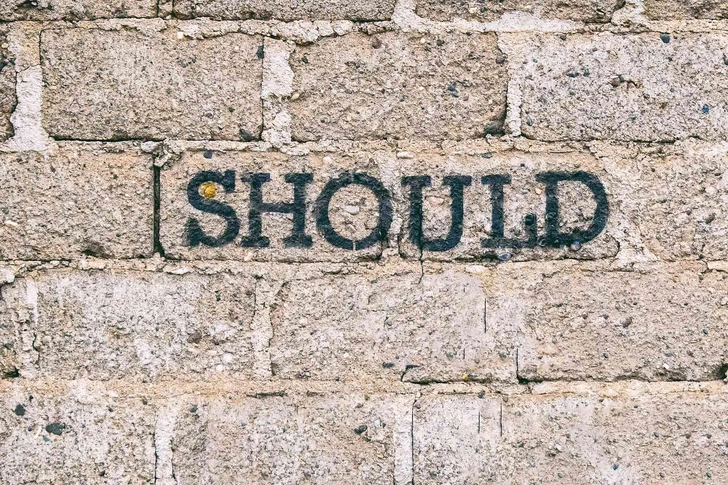
Don’t ‘should’ yourself.
I vetted my second and third opinions, and oncologist candidates like I was nominating a Supreme Court justice. Then, at the very last minute, I “should” all over myself. I chose The Greatest Cancer Treatment Center in the World, and The Greatest Rockstar Oncologist to Ever Grace the Cover of a Magazine, the one I ‘”should” go with according to popular opinion, even though my gut was screaming “nope” during the initial consultations. I ultimately bailed on the Rockstar Doc after a series of screwups, ranging from shaming me about my weight and marital status, to forgetting that I’d had the major mastectomy surgery that she, in fact, had recommended, while I was sitting before her with drainage tubes coming out of my armpits and literally zero breasts where my breasts used to be.

It’s a grind.
Breast cancer treatment can be all the scary, painful things TV and movies make it out to be, and then some. But what they don’t show on TV is that it’s also megaboring. Welcome to a tedious task list of appointments and procedures, each a different flavor of terrible. It can feel like a monotonous, full-time job with no perks and a negative paycheck. But the same universe that gave us beige waiting rooms also gave us the phrase “Treat Yourself.” Reward yourself for every item you check off the chore chart from hell and give yourself a gold star for every big and little accomplishment.

The patient journey is annoyingly image focused.
People are obsessed with how women look in general. In Breast Cancer Treatment Land, it’s no different. It’s baked right into the patient experience -- from Day 1. You don’t get a break from the nonstop focus on your image just because you’re trying to save your own life. You will discuss the cosmetic outcomes of surgical interventions, but you will also be given a pamphlet for a thing called “Look Good, Feel Good.” That’s where well-intentioned dumb-dumbs try to teach you how to spackle your face so it doesn’t scare people. Sorry, but there’s no product powerful enough to conceal the fact that you feel like reconstituted dirt. I’ve got no advice for you here, I just want you to know it’s a thing, so that you’re mentally prepared for the heap of cognitive dissonance coming your way.
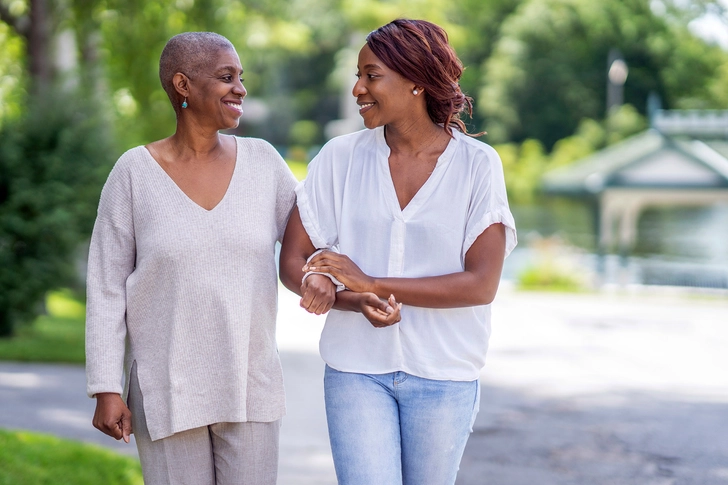
There’s going to be pressure on you to wear a wig, but there’s no rule saying you have to.
“Are you going to get a cool wig?” might be the first thing some people say to you when you tell them about your diagnosis. Sidebar: People will not know what to say, and this classic wig comment is actually one of the better bad things you’ll hear. Also, just know that there will be a surprising emphasis from the medical establishment on finding yourself a good hair solution. I bet you a can of vintage Aqua Net hairspray that there will be a wig boutique in the hospital, or nearby. But don’t be afraid to rock the bald look. You may not even lose your hair, by the way, as not all treatments have that side effect. But if you are heading that way, 5 out of 5 of my cancer buddies consulted for this article highly recommend that you go to a proper barber shop and get your head shaved before your hair starts falling out. Shaving your head is one thing you can control, and it feels like you’re giving the finger to cancer when you do it.
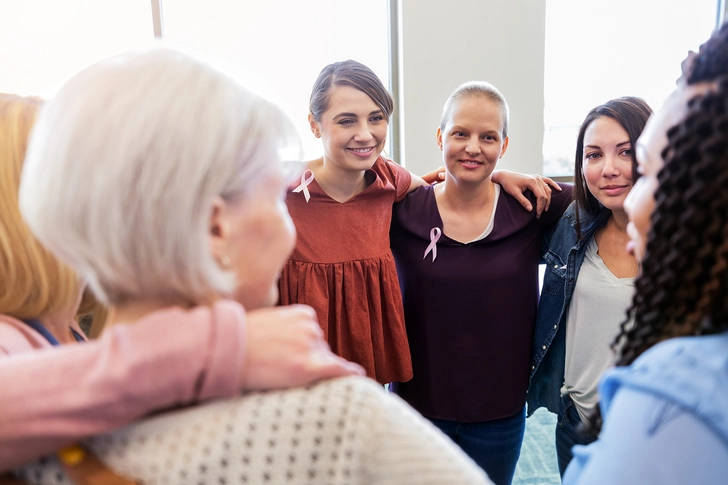
People will try to set you up with their cancer friends.
It’s a well-intentioned gesture, but you don’t have to do cancer-buddy blind dates right now. It’s OK to be discerning about who you let into your circle of trust. Breast cancer survivors are a tough crew. They’ve been through the wringer. They’ve seen things. But they aren’t trained in counseling. There are great patient support and advocacy organizations, and most cancer care centers can refer you to fellow survivors who are doing this kind of work who’ve been trained on things like how to not scare the living hell out of you. So when they give you the pamphlet on the wig boutique and the makeup party, ask if they’ll also give you a pamphlet on support and advocacy resources.
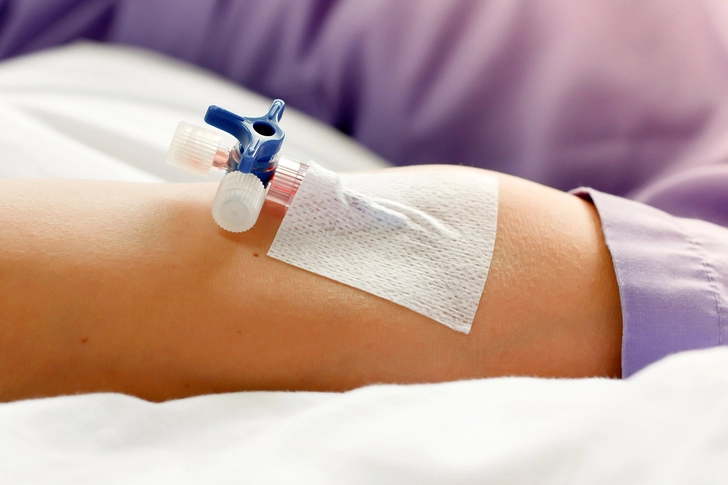
The war on your body also takes a toll on your soul.
It’s not so much the cancer that scars you, as it is the war your treatment wages on your body in order to rid your system of the cancer. The treatment itself helps put the capital T in PTSD. Be as aggressive and proactive as you can be about assembling a support network of friends, family, and licensed mental health counselors and practitioners. And remember that even though the advances that have been made in things like targeted gene therapy and adjuvant drug therapies are incredible, Western medicine’s approach to managing the long-term trauma of treatment and everything that goes with it, is still playing catch up.

No comparisons!
Everybody’s path is unique. Comparing your cancer stage, your prognosis, or your stats can be a real dark hole that you can’t afford to spend your energy on. There will inevitably be someone in your Instagram feed who is making breast cancer look heroic. Maybe they’re making kale smoothies and backpacking on the weekends, despite being in treatment. Maybe they sailed through chemo, and you wound up in the hospital. Or, on the flip side: Maybe they are suffering mightily and you’re mustering through just fine and you feel guilty about it. Try to keep those comparison vibes in check.
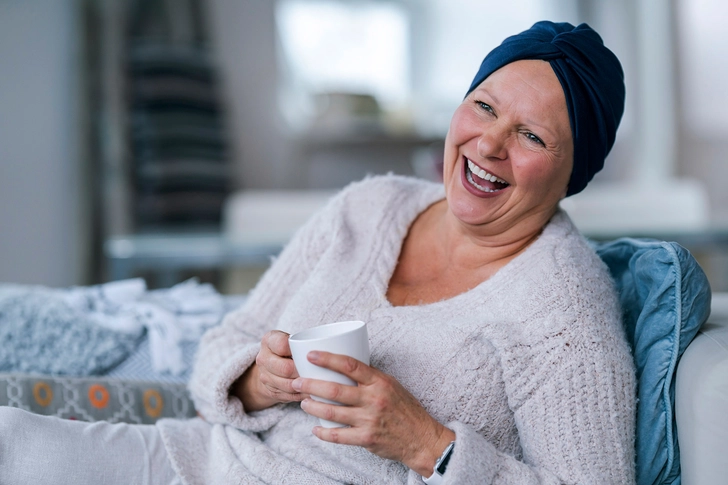
You may experience a thing called ‘Cancer Joy.’
I know it sounds crazy. But along with the intense unpleasantness, there can be moments of heightened joy. Even in the middle of a real life hellscape, you may find yourself having some of the best laughs you’ve ever had. It’s a thing! Here’s an entry from my diary from March of 2015:Thanks a lot, cancer. No really. I’m actually semigrateful to you tonight because I only have to be a person right now. I don’t need to be my own brand. I don’t need to save the world. Thank you for helping me see how little the bullet points on my resume will matter in the end, and how much the love surrounding me will. I hope I can hang on to this feeling.

It changes you. There’s no changing that.
When I was first diagnosed, I was adamant that breast cancer would not change me. Bless my silly little heart for thinking that I could go through a prolonged, life-threatening ordeal with all of the spiritual, physical, mental, emotional, and financial implications of, well, cancer, and come out on the other side as the same person. It took my breasts, my fertility, and my life savings. A diagnosis represents a significant loss, and with loss comes grief. And grief isn’t something you waltz away from unscathed. I’m the picture of scathed. But I’m still here. And that’s something.
IMAGES PROVIDED BY:
- Justin Paget/Getty Images
- Jupiterimages/Getty Images
- Peter Bannan/Getty Images
- FatCamera/Getty Images
- Javier Ghersi/Getty Images
- GuindillayPimienta/Getty Images
- Justin Lambert/Getty Images
- FatCamera/Getty Images
- SDI Productions/Getty Images
- Hirunyaphornkul/Getty Images
- DNY59/Getty Images
- Fly View Productions/Getty Images
- Micha Pawlitzki/Getty Images